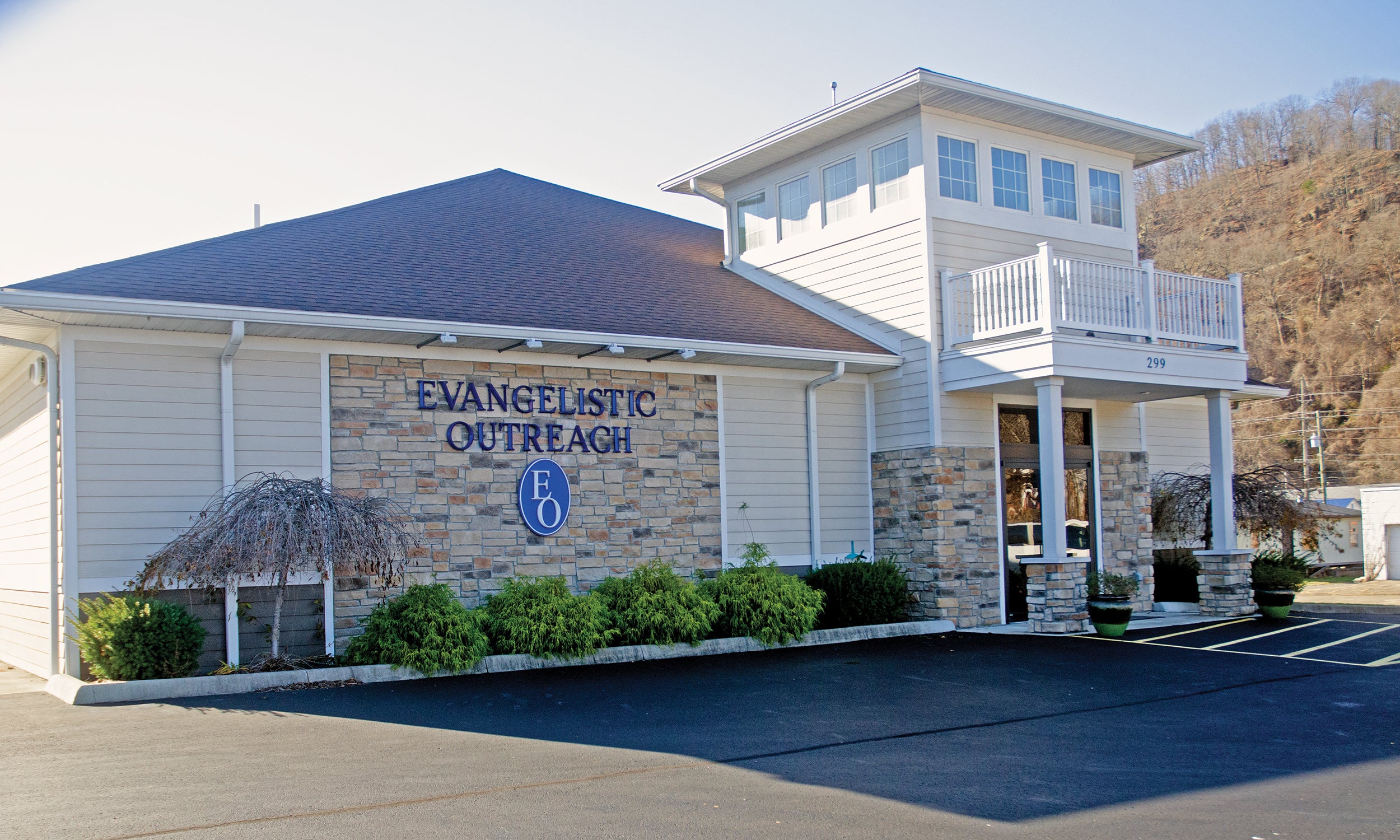PROFILE 2023 — Reaching the World
Published 12:00 am Sunday, April 2, 2023

- Left: Dr. Calvin Ray Evans, at Evangelistic Outreach's headquarters in New Boston in November 2022 (The Ironton Tribune | Heath Harrison); RIGHT: Dr. Calvin Evans, founder of Evangelistic Outreach (Submitted photo)
Evans family has operated Evangelistic Outreach for more than six decades
From its humble beginning in a family residence, Evangelistic Outreach, located in New Boston, has grown into a global ministry, spreading a message of faith to millions and providing humanitarian aid worldwide.
Approaching nearly seven decades in operation, the ministry began in 1956, founded by Dr. Calvin Evans at his home in Pedro.
“When it started, he was doing itinerant meetings,” his son, Dr. Calvin Ray Evans, who now serves as president and director said. “And, from one of those meetings, he was given an offering, just a love offering. He felt like he was bi-vocational at that point and didn’t want to take the money for himself. So he went and signed a contract with WTCR, which was the was the strongest radio station at in our area in the late ‘50s, and he launched the ministry from that.”
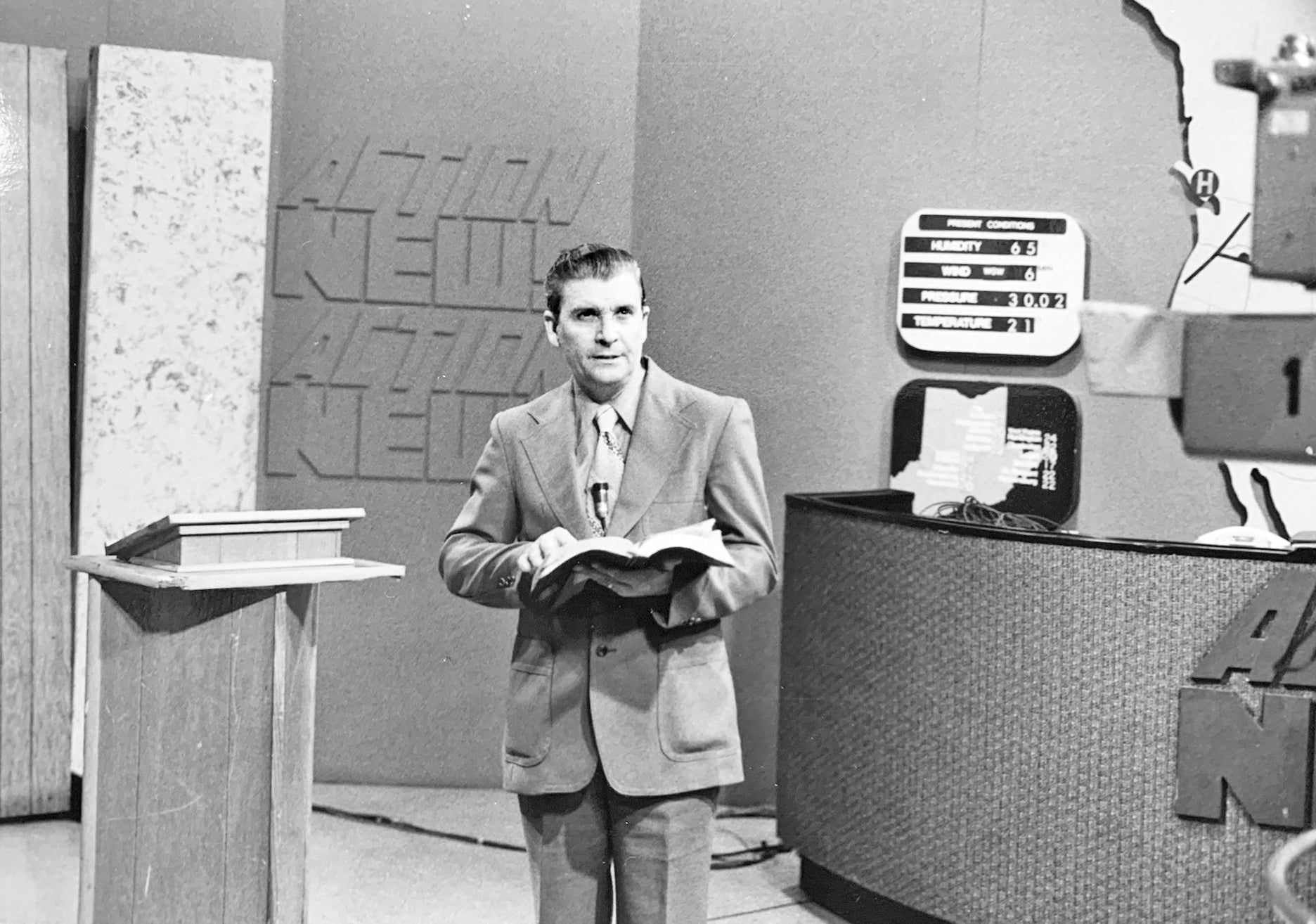
Dr. Calvin Evans delivers a sermon for his evangelistic broadcast using the news studios of WOWK in Huntington in 1972. (Submitted photo)
Evans recalls the family all taking part in the work at their home in the beginning.
“I’m one of seven kids,” he said. “Mom would fix dinner and then we could clear off the dining room table. We would stuff envelopes and send out mail and newsletters with messages in them from our dining room table as a family.”
He said it soon outgrew this and his father moved the offices into a mobile home beside the house.
He said, from there, they moved to Ironton, where they remained until eight years ago, when they arrived at their current location in New Boston.
Dr. Evans spent his first decade preaching on the radio, before moving into television in the late 1960s.
“It branched out into television ministry, and, from that, it’s branched out to the Internet and a social media ministry and continues to expand from that,” Evans said. “Dad was a visionary. When he went on television, there were three stations in this area. And everyone didn’t get all three, because it was antenna. So he said, ‘I think that would be a tool to be able to reach people.’ And, way before anyone saw what was coming with the Internet, as soon as he read about it and heard about it, he said, ‘We’ve gotta be on the Internet.’ He was always looking for next channel to be a tool to get message out.”
After nearly five decades in the broadcast ministry, Dr. Evans died, following a heart attack while delivering a sermon in Tampa, Florida in 2006. On display in his son’s office is the Bible he was using, still open to the page and notes he was preaching from.
The younger Evans, who had taken over as president in 1998, as his father’s health declined, said he took on more responsibilities, while also serving as the pastor of Rubyville Community Church, a nondenominational institution, located a few miles north of the ministry in New Boston.
Of the mission of the ministry, Evans says, “Definitely, it is always to present the Gospel. That’s first and foremost — and to meet the needs of individuals and help people as well — those in poverty around the world and in our area.”
The weekly broadcasts, which are carried locally on WSAZ, reach all of the eastern seaboard in the United States. Intros by Evans and assistant director Brian Baer are filmed at the ministry’s offices and at the church, while footage of Evans’ sermons there, and from his travels, are used, supplemented by performances from Gospel artists such as the Tammy Jones Robinette, 11th Hour and the Primitive Quartet.
“Altogether, we’re in about 30 percent of homes in America,” Evans said. “And that doesn’t include our Internet channel, which is nationwide and worldwide as well.”
He said, with the stations they are carried on, Evangelistic Outreach is available to 75-85 million households.
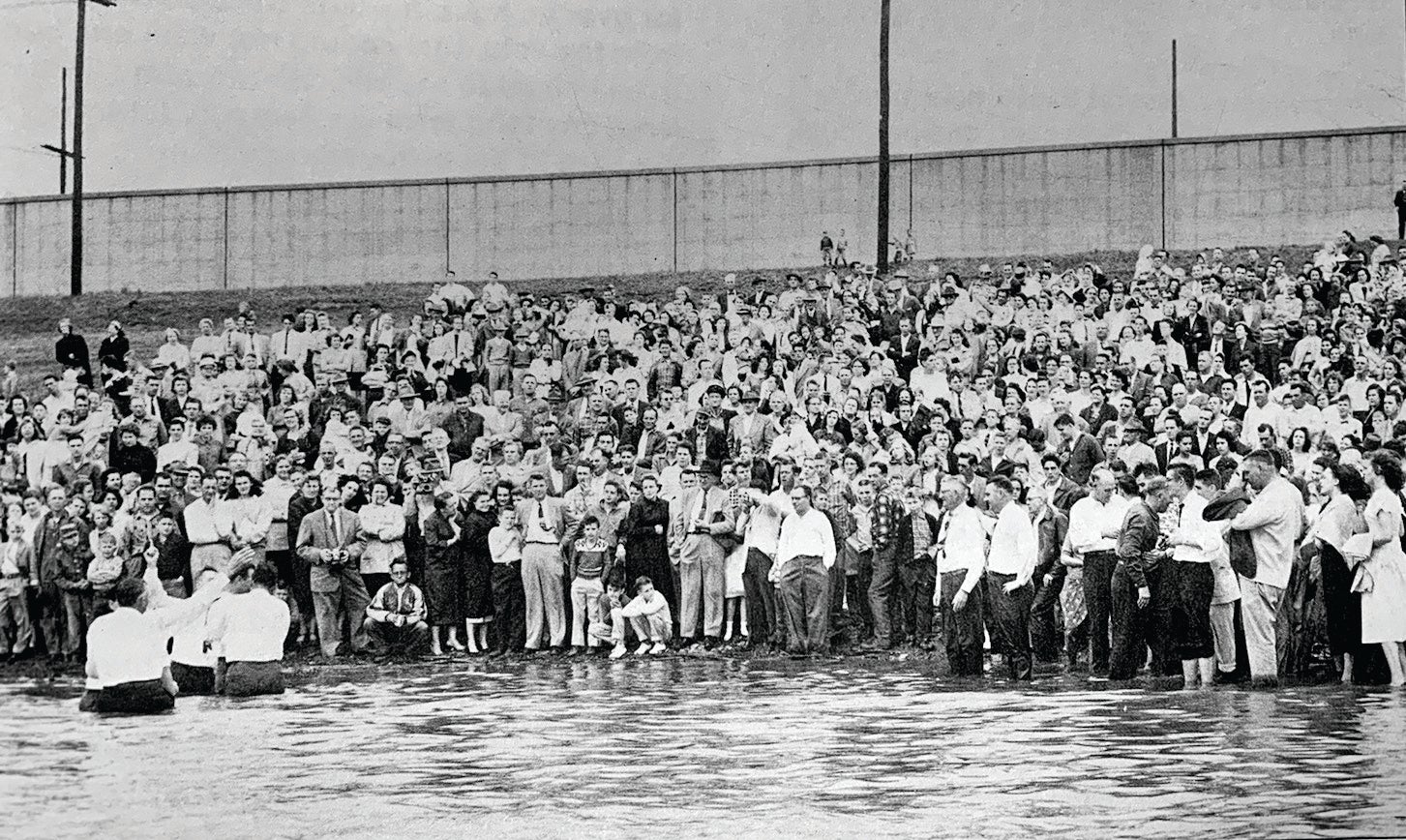
A portion of a crowd of thousands who attended a baptismal service, following the conclusion of a 13-week revival on the Ironton riverfront in 1958. Ministers officiating were Tommy and Eddie DePriest, B.C. Stumbo and Dr. Calvin Evans. (Submitted photo)
Evans said it amazes him to learn of people in Hawaii, who watch each week online, when it would be pre-dawn in that time zone.
“And now we’re hearing of lot of people in Middle East, watching it live in middle of night,” he said. “That is staggering to me. And they’re like our extended church family. We’ve got people out in the west, three hours behind us. That’s 6:30 in the morning on Sunday. It is amazing. You become the pastor of hundreds of thousands. Even though you’re in your pulpit, preaching, you become pastor to these people.”
He said he often hears of those in nursing facilities, where the broadcast is watched, and he recalls a woman in Ashland in her 90s, who, while invalid, watched faithfully for years.
“It had been her church,” he said. “We’re not taking the place of church. We’re taking the church to them, because they can’t help their situation. It makes all the difference. To me, that is very fulfilling.”
Humanitarian aid is a large part of what the ministry carries out from their New Boston offices. Evans said they have spent the past year working to provide aid to victims of flooding in eastern Kentucky.
“We give a lot of relief and help to different areas, as needs arise,” he said.
In fact, he said the main reason for their move to New Boston was to provide more space to accommodate the 80 regular volunteers that help in these efforts.
“With our outreach, we go out into different areas across the country and preach,” Evans said. “We work a lot in small, rural churches, as well as metropolitan churches, but they often don’t have any support base if there is a disaster. They don’t have a food pantry or a supply warehouse. And, with our networking with people, we’re able to bring those things to them or supply the funds to help them. Currently, we’re involved in our food basket project, which, last year, helped over 8,600 families in the Appalachian area.“
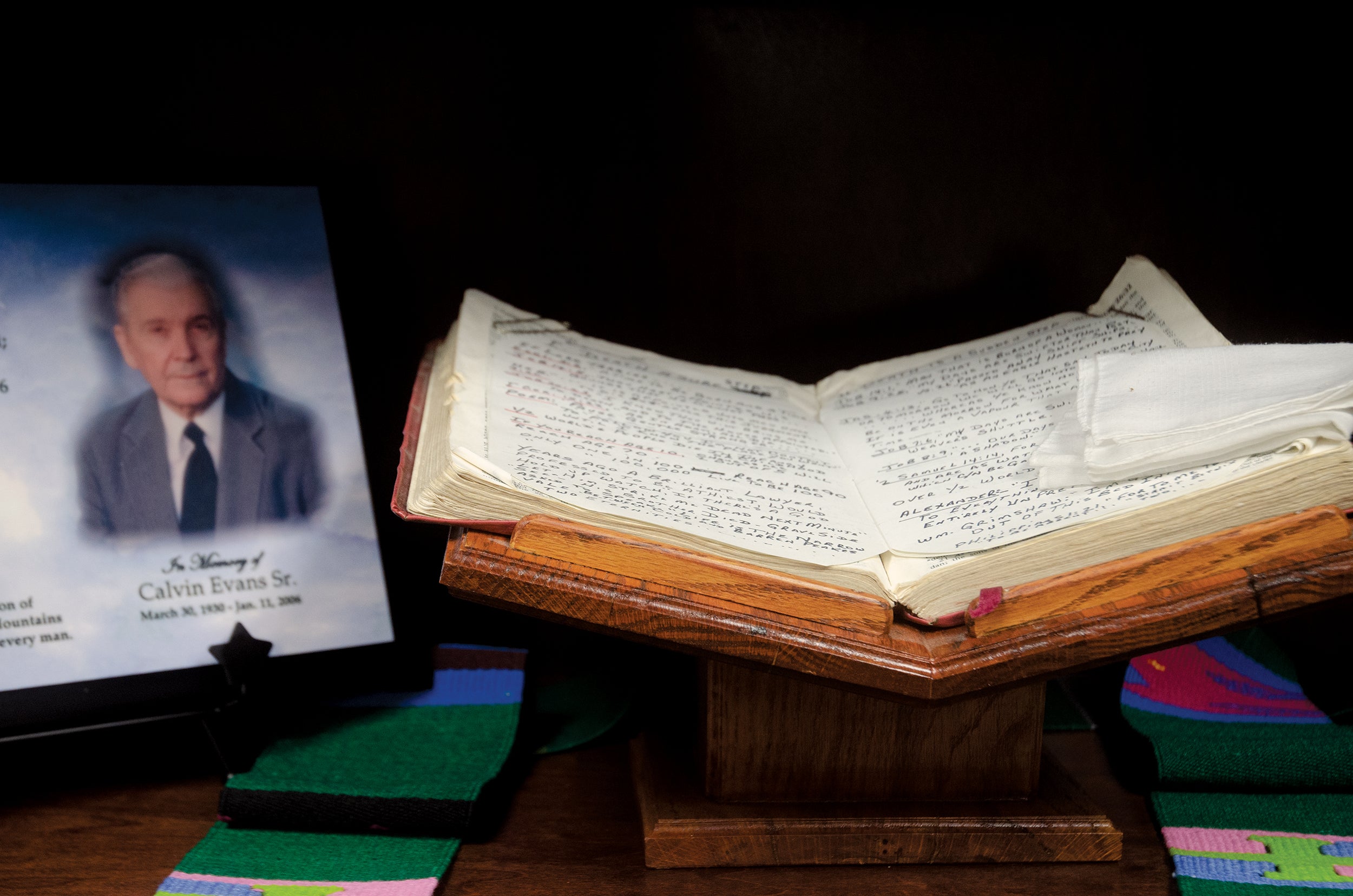
A Bible, on display at the offices of Evangelistic Outreach, is kept open to the page and notes from which Dr. Calvin Evans was preaching when he suffered a fatal heart attack in Tampa, Florida in 2006. (The Ironton Tribune | Heath Harrison)
Evans said they worked with more than 100 churches on aid in the past year.
One of their longest relationships in their humanitarian efforts is with Ironton City Mission.
“Jim Cremeans, who was their second pastor, “ he said. “Jim has been on the board of directors since the early days of ministry and is still on our board. When Dad saw the ministry growing, first, nationally, but then, by the mid ‘70s, he saw the need and the board grew to find people with expertise in different areas for the board. Jim was on, of course, because of his benevolence to people in the area. We also had individuals with expertise in insurance, expertise in business, expertise in banking.”
He said this approach has made their efforts more efficient.
“It’s given us a good balance of knowledge to be able to operate to make sure you’re able to reach more people, while using less money,” Evans said.
Evans recalls two of the most trying moments for the world that took place during the ministry’s history.
One was the Sept. 11, 2001 terrorist attacks on the United States.
“It definitely one of the most challenging times,” he said, recalling that he was driving into their ministry’s Ironton office, when he heard the news come over the radio.
“I thought, ‘This can’t be,’” he said. “I can only imagine how others felt.”
He said the ministry was in the middle of a multi-day tent meeting in Ironton during the week of the attacks.
“We went to the meeting one day and everything’s fine,” he said. “The next day, everything changed. We had hundreds and hundreds coming every night. You can imagine how people felt when they came to that service that night after 9-11. It just altered everything — but I was able to watch Dad stand and preach a message of hope to a people who, at that moment, felt confusion. Looking back on it now, what are the chances of being in one of your biggest meetings of the year when that happened?”
More recently, Evans said the ministry had to adapt to the challenges of the COVID-19 pandemic and the shutdowns that followed it in March 2020.
“It was probably two of the harder years of our ministry,” he said. “No one knew when it would end and when people could start congregating again.”
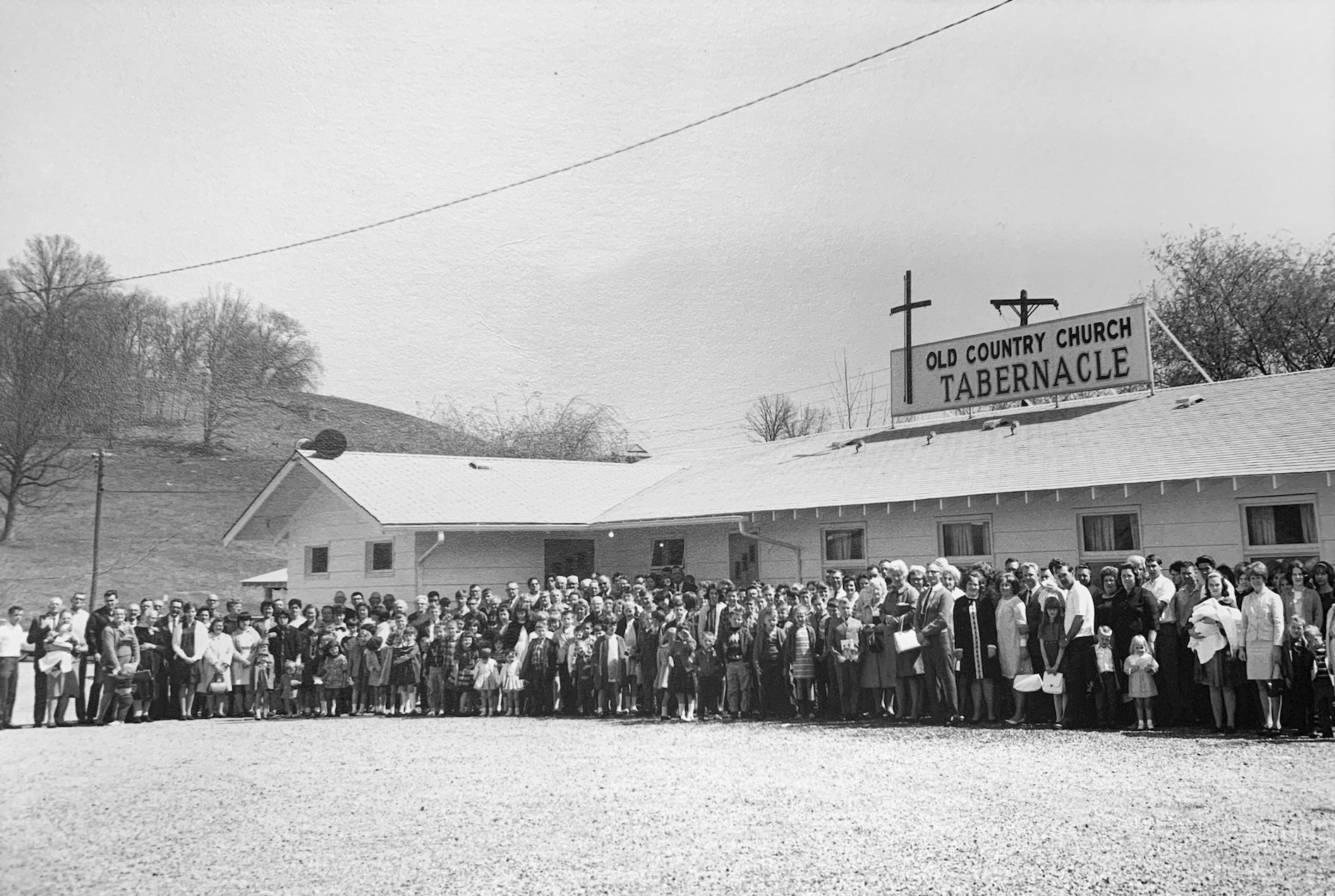
Old Country Church Tabernacle, on State Route 93, near Oak Hill, where Calvin Evans pastored. (Submitted photo)
Evans said the ministry’s facilities put them in an ideal place where they could serve the public.
“I was very blessed when I met with the leadership team,” he said. “We knew people couldn’t come. No one knew what severity the shutdown would be be. I said, ‘We’ve got everything in place here. We’re high definition on broadcasting capabilities. It’s going to be great step of faith. A lot of ministries can’t make it if we don’t help them.’”
He said they immediately launched their efforts and began contacting singers and other ministries, inviting them in.
“We would shoot for high impact services, so people can still experience the presence of the Lord and worship in their own home,” he said. “It became less about fellowship and more about worship. That was our approach: Worship where you are, because we had to.”
Evans said it was a “draining time” in his work as a minister, recalling doing 21 funerals in 30 days.
At times, he said, due to social distancing, there were only four to five people at the funerals. He recalls a funeral director asking why he kept doing them.
“I said, ‘Everybody deserves something said when they pass. Even if there’s nobody here, but me and you, they deserve that”.
He said thousands logged in to watch the ministry’s first service of the pandemic.
“It was amazing,” he said. “There were times we went into that sanctuary — there was nobody but the camera crew and production crew.”
But he said it helped them to reach many they had not before.
“We told them, ‘You don’t have to be afraid,’” he said. “There are things you respect, but not fear. We’ve got faith and need one another. What was a trying time emotionally wound up being a great growth time, spiritually.”

A memorial plaque for Dr. Calvin Evans, on display at Evangelistic Outreach’s headquarters in New Boston. (The Ironton Tribune | Heath Harrison)
For those who have not tuned in to their broadcasts, Evans said he would tell them, “First of all, our goal is to help people, not to hurt them.”
“If I can’t bless them, I won’t bother them,” he said. “We really, more than anything, want people to know we care. Our motto has always been, ‘Reach the unreached.’ It’s been the motto of this ministry since the day it started to bring people together for Christ.”
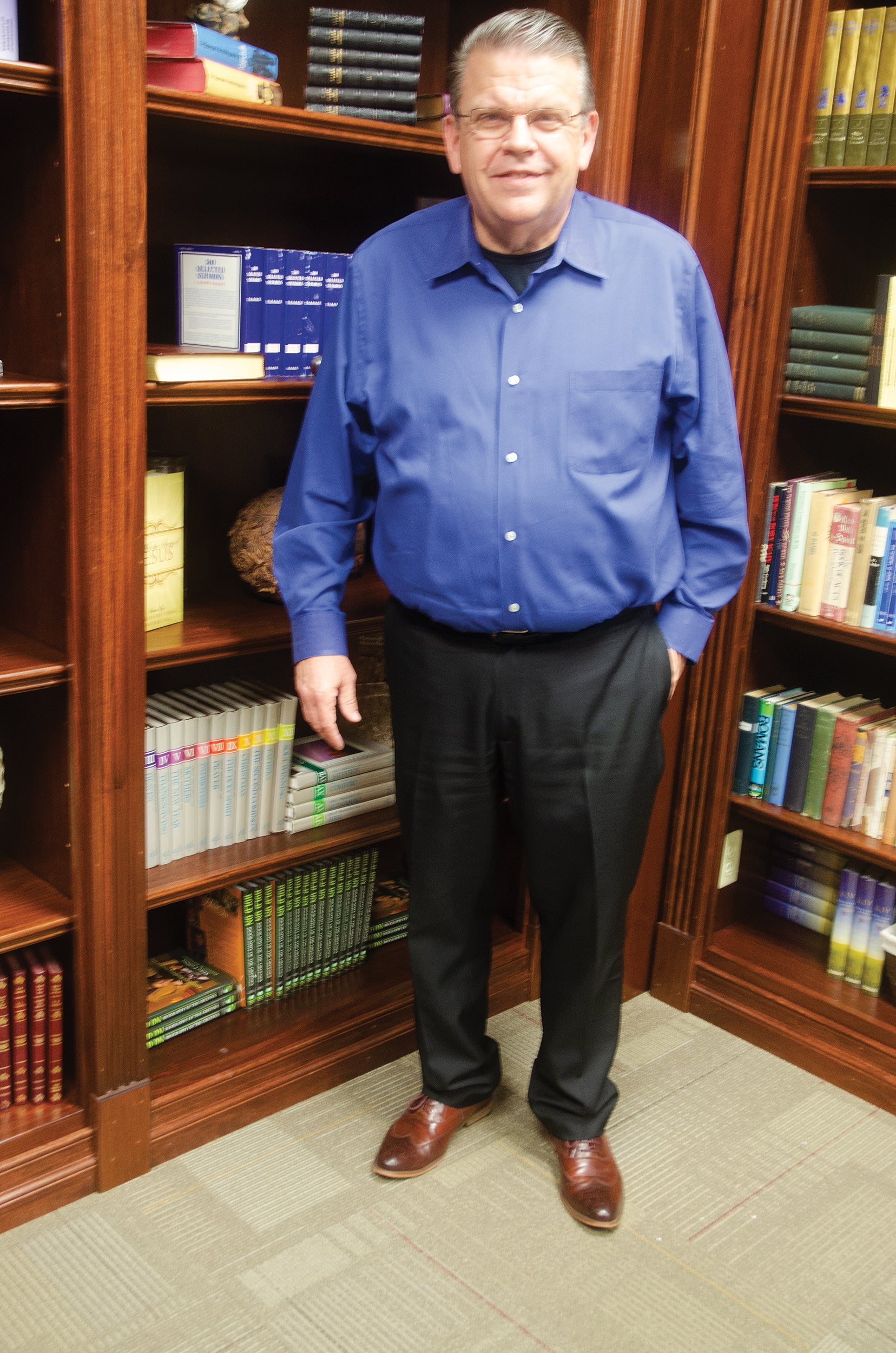
Dr. Calvin Ray Evans, at Evangelistic Outreach’s headquarters in New Boston in November 2022 (The Ironton Tribune | Heath Harrison)
Evans said they have several events coming up for the year.
First, will be their annual camp meeting in the Smokey Mountain, which takes place at Pigeon Forge, from April 17-20.
And, their annual Spring Jubilee is set for May 15- 19 in Lucasville, the event’s 25th year.
“There’s no admission cost, and we’ll have nationally-known groups,” he said. “People get to hear people they otherwise wouldn’t get to hear. It’s always a blessing. It’s a wonderful, wonderful week and a great week of unity for churches, too.”
Evans said so much of what they have done comes from the foundation built by his father and his decision to go on television and radio.
“It was great step of faith on his part,” he said. “When you do that, there are finances and risks. He would pray about it and said, ‘That’s what I want to do.’ He was steadfast at it, slowly but surely, but, once he made up his mind, he would see it through until it was done.”
With the ministry’s growth and their new building, Evans said, “I’d give anything if Dad could have seen the office here.”
“He passed before we came here, but he would have been so thrilled to see what God’s doing and more people being reached,” he said. “And that was his goal. He would always use Moses as an example. Moses went to Mount Nebo and God let him see the Promised Land, but he said, ‘You can’t go in.’ Moses died there and God buried Moses. We don’t know where. No one’s found the body yet. But Dad’s example was this — He saw further than his days. He didn’t get to go, but he knew where people were going. He always said, ‘Make your vision longer than your days.’ I think that’s a good way to live as well.”


